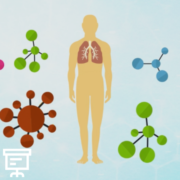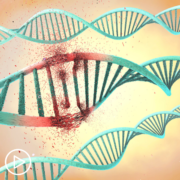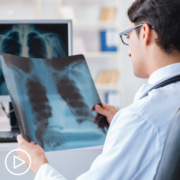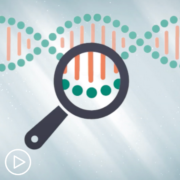What Are Common Lung Cancer Mutations?
What Are Common Lung Cancer Mutations? from Patient Empowerment Network on Vimeo.
Advances in genetic testing have changed the way lung cancer is diagnosed and treated. Dr. Tejas Patil reviews common lung cancer mutations and how these mutations affect treatment choices for patients with lung cancer.
Dr. Tejas Patil is an academic thoracic oncologist at the University of Colorado Cancer Center focused on targeted therapies and novel biomarkers in lung cancer. Learn more about Dr. Patil, here.
Download Program Resource Guide
See More From INSIST! Lung Cancer
Related Programs:

Deciding on a Lung Cancer Treatment? Essential Testing for Optimal Care |

How Can You Access Personalized Lung Cancer Treatment? Resource Guide |

|
Transcript:
Dr.Patil:
There’s been tremendous advances in lung cancer. One of the biggest advances has been the appreciation that there are very specific mutations that actually “drive” cancers that cause them to grow, divide and metastasize.
We call this mutation an oncogene. Over the past two decades, there have been many oncogenes in lung cancer that have been identified. Interestingly several of these oncogenes, such as the ALK mutation, or the EGFR mutation, tend to occur in patients who were never smokers.
So, while smoking is the major environmental risk factor for lung cancer, our understanding of these, through molecular testing has identified a group of patients who were never smokers yet still developed lung cancer. The reason this is important to know is that there’s a variety of targeted therapies available for patients who do have mutations such as ALK or EGFR, and these are typically associated with very favorable outcomes in lung cancer.
I should mention that the scope of what mutations we find very much depends on the type of molecular test that’s performed. This is a topic that’s beyond the scope of this discussion, but know that when you say you are getting genetic testing, a lot of that depends on the genes that are in the test, meaning if a molecular test is only looking for 10 genes, or 10 mutations, it’s only going to pick up 10 mutations versus more comprehensive molecular testing, which look at hundreds or even thousands of genes, will identify more mutations.
That being said, there are approximately 10 mutations currently for which there are targeted therapies, either that are commercially licensed through the FDA, or are being evaluated in the context of the clinical trial.
And in patients who are heavy smokers, the most common mutation that we see that’s an oncogene is a KRAS mutation, and there’s currently drugs in clinical trials that are looking to target a very specific KRAS mutation.
In never smokers, the mutation spectrum is actually quite a bit more varied, and here, we see mutations such as ALK, EGFR, ROS1, RET, MET, HER2 and BRAF.
There’s another biomarker that we use in lung cancer that’s not technically a mutation, per se, but it’s very important for clinicians to obtain, and that’s called a PD-L1 score. This is a score that helps clinicians decide how effective immunotherapy can be in a certain patient.
There are some mutations that are very common in lung cancer such as TP53, but these are mutations where we can’t actually, we don’t have a targeted approach to manage them. So, when I refer to common mutations, I’m talking about mutations where I either have a drug that is available and able to target the mutation, and this drug is being either investigated in a clinical trial, or is commercially licensed.
In lung cancer, the most common oncogene would be KRAS, and there, there’s a couple of exciting clinical trials where there are some promising drugs in development for treating this specific mutation which has been very challenging to treat in lung cancer.




![Spanish [ACT]IVATED NSCLC Biomarkers Resource Guide](https://powerfulpatients.org/wp-content/uploads/Spanish-ACTIVATED-NSCLC-Biomarkers-Resource-Guide-180x180.png)





